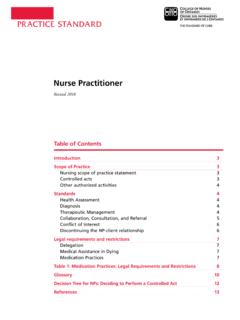Transcription of Ethical Framework for Good Practice in Counselling ...
1 Ethical Framework for Good Practice in Counselling & PsychotherapyThis Ethical Framework for Good Practice in Counselling and Psychotherapyis published by the British Association for Counselling and psychotherapy , BACP House, 15 St John s Business Park, Lutterworth, Leicestershire, LE17 : 01455 883300f: 01455 550243e: is the largest professional organisation for Counselling and psychotherapy in the UK, is a company limited by guarantee 2175320 in England and Wales, and a registered charity, 298361. British Association for Counselling and psychotherapy 2001, 2002, 2007, 2009, published 1 April edition published 1 April edition published 1 January edition published 1 February original and revised versions of the Ethical Framework have been written by Professor Tim Bond and the Professional Conduct Procedures by Gr inne Griffin with the assistance of the people listed below.
2 The Ethics for Counselling and psychotherapy and Guidance on Good Practice in Counselling and psychotherapy was steered by the Unified Code Working Party of BACP: Professor Tim Bond (Convenor), Roger Casemore, Alan Jamieson, Susie Lendrum, Val Potter. The Professional Conduct Procedure and Heads of Complaint were written by Gr inne Griffin in consultation with Professor Tim Bond, Alan Jamieson and John O independent panel of consultants reviewed the original version including: Professor Brenda Almond, Professor Richard Ashcroft, Professor Alastair Campbell, Roger Casemore and Julie publication is copyright under the Berne Convention and the Universal Copyright Convention. All rights reserved. No part of this publication may be produced or transmitted in any form or by any means, including photocopying, microfilming, and recording, without the written permission of the copyright holder, application for which should be addressed to the Chief Executive at BACP.
3 Such written permission must always be obtained before any part of this publication is stored in a retrieval system of any nature, or electronically. ISBN: 1-905114-06-0 ISBN: 13: 978-1-905114-06-1 Price: 7, p&p free. Copies may be obtained from the Book Orders Department at BACP in Lutterworth at the address given above. Cheques should be made payable to BACP. The text is also downloadable from the BACP website, : Paul Revell BACP 2001, 2002, 2007, 2009, 2010 Ethical Framework for Good Practice in Counselling & Psychotherapy01 ContentsEthics for Counselling and psychotherapy 2 Values of Counselling and psychotherapy 2 Ethical principles of Counselling and psychotherapy 3 Personal moral qualities 4 Guidance on good Practice in Counselling and psychotherapy 5 Providing a good standard of Practice and care 5 Working with colleagues 9 Probity in professional Practice 9 care of self as a practitioner 10 Professional Conduct Procedure 11 Introduction 11 Making a complaint 12 The formal Professional Conduct Procedure 13 The Professional Conduct Hearing 14 Sanction 15 Formal Appeals Procedure 15 Appeal Hearing 16 Publication 17 Effective Date 17 Heads of Complaint 18 Ethical Framework for Good Practice in Counselling & psychotherapy BACP 2001, 2002, 2007.
4 2009, 201002 Ethics for Counselling and psychotherapyThis statement, Ethics for Counselling and psychotherapy , unifies and replaces all the earlier codes for counsellors, trainers and supervisors. It is intended to guide the Practice of Counselling and psychotherapy by all members of the British Association for Counselling and psychotherapy (BACP) and inform the Practice of closely related roles that are delivered in association with Counselling and psychotherapy or as part of the infrastructure to deliver these services. Being ethically mindful and willing to be accountable for the Ethical basis of Practice are essential requirements of membership of this Association. In this statement the term practitioner is used generically to refer to anyone with responsibility for the provision of Counselling or psychotherapy -related services. Practitioner includes anyone undertaking the role(s) of counsellor, psychotherapist, trainers and educators for these roles, providers of coaching and mentoring in association with Counselling and psychotherapy , supervisors, and practitioner researchers.
5 Members of this Association who are providers of services using Counselling skills, embedded counsellors, managers and researchers of therapeutic services, are required to be accountable in accordance with the Ethical Framework in ways appropriate to their role and to communicate appropriately the basis of their Ethical accountability and expectations. The term client is used as a generic term to refer to the recipient of any of these services. The client may be an individual, couple, family, group, organisation or other specifiable social unit. Alternative names may be substituted for practitioner and client in the Practice setting, according to custom and statement marks an important development in approach to ethics within the Association. One of the characteristics of contemporary society is the coexistence of different approaches to ethics.
6 This statement reflects this Ethical diversity and supports practitioners being responsive to differences in client abilities, needs and culture and taking account of variations between settings and service specialisations by considering: n Values n Principles n Personal moral qualitiesThis selection of ways of expressing Ethical commitments does not seek to invalidate other approaches. The presentation of different ways of approaching ethics alongside each other in this statement is intended to draw attention to the limitations of relying too heavily on any single Ethical approach. Ethical principles are well suited to examining the justification for particular decisions and actions. However, reliance on principles alone may detract from the importance of the practitioner s personal qualities and their Ethical significance in the Counselling or therapeutic relationship.
7 The provision of contextually sensitive and appropriate services is also a fundamental Ethical concern. Variations in client needs and cultural diversity differences are often more easily understood and responded to in terms of values. Therefore, professional values are becoming an increasingly significant way of expressing Ethical of Counselling and psychotherapyThe fundamental values of Counselling and psychotherapy include a commitment to: n Respecting human rights and dignity n Protecting the safety of clients n Ensuring the integrity of practitioner-client relationships n Enhancing the quality of professional knowledge and its application n Alleviating personal distress and suffering n Fostering a sense of self that is meaningful to the person(s) concerned n Increasing personal effectiveness n Enhancing the quality of relationships between people n Appreciating the variety of human experience and culture n Striving for the fair and adequate provision of Counselling and psychotherapy servicesValues inform principles.
8 They represent an important way of expressing a general Ethical commitment that becomes more precisely defined and action-orientated when expressed as a principle. BACP 2001, 2002, 2007, 2009, 2010 Ethical Framework for Good Practice in Counselling & Psychotherapy03 Ethical principles of Counselling and psychotherapyPrinciples direct attention to important Ethical responsibilities. Each principle is described below and is followed by examples of good Practice that have been developed in response to that principle. Ethical decisions that are strongly supported by one or more of these principles without any contradiction from others may be regarded as reasonably well founded. However, practitioners will encounter circumstances in which it is impossible to reconcile all the applicable principles and choosing between principles may be required. A decision or course of action does not necessarily become unethical merely because it is contentious or other practitioners would have reached different conclusions in similar circumstances.
9 A practitioner s obligation is to consider all the relevant circumstances with as much care as is reasonably possible and to be appropriately accountable for decisions trustworthy: honouring the trust placed in the practitioner (also referred to as fidelity)Being trustworthy is regarded as fundamental to understanding and resolving Ethical issues. Practitioners who adopt this principle: act in accordance with the trust placed in them; strive to ensure that clients expectations are ones that have reasonable prospects of being met; honour their agreements and promises; regard confidentiality as an obligation arising from the client s trust; restrict any disclosure of confidential information about clients to furthering the purposes for which it was originally : respect for the client s right to be self-governingThis principle emphasises the importance of developing a client s ability to be self-directing within therapy and all aspects of life.
10 Practitioners who respect their clients autonomy: ensure accuracy in any advertising or information given in advance of services offered; seek freely given and adequately informed consent; emphasise the value of voluntary participation in the services being offered; engage in explicit contracting in advance of any commitment by the client; protect privacy; protect confidentiality; normally make any disclosures of confidential information conditional on the consent of the person concerned; and inform the client in advance of foreseeable conflicts of interest or as soon as possible after such conflicts become apparent. The principle of autonomy opposes the manipulation of clients against their will, even for beneficial social ends. Beneficence: a commitment to promoting the client s well-beingThe principle of beneficence means acting in the best interests of the client based on professional assessment.






